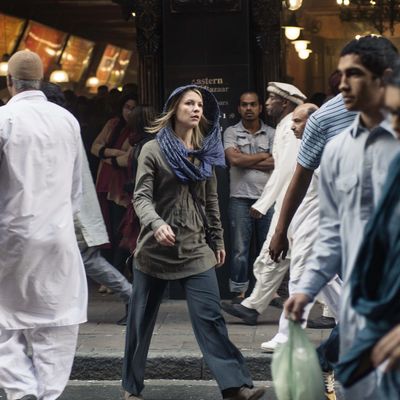
When a show goes awry, how many seasons do you give it to correct its course?
It depends on the show, of course, but in the case of Homeland, my answer is two. Season one was close to great (even though, as I’ve said many times on this site, it probably should’ve been a miniseries). Season two was a train wreck, and season three slightly less so. At least they finally killed off Brody (Damian Lewis), the Marine turned terrorist turned double-agent turned triple-agent whose tryst with CIA analyst Carrie Mathison (Claire Danes) sparked a furtive affair in season one, transforming what might otherwise have been a military-political process series into a doomed love story. Sure, the love story had its moments (season two’s “Q&A” was a series high point), but it also condemned Homeland to a dramaturgical in-between state. It was too preposterous to be taken seriously as a Statement on anything, and too grim to be enjoyable as high-toned escapism, and it contained just enough fretting over Carrie and Brody (and other romantic pairings) that whenever the story focused on Carrie’s boss and mentor Saul (Mandy Patinkin) and his intrigue at CIA headquarters, the National Security State shenanigans felt like interruptions. Or maybe it was the romantic scenes that felt like interruptions of the CIA-Pentagon–White House scenes. Like I said: The in-betweenness was killing the show.
And now here we are in season four, at the point when I was ready to give up on Homeland, and wouldn’t you know it: It’s good again. Not great, but good: smarter than you expect, more patient with its storytelling, less interested in the characters’ plotting and counter-plotting than in their often miserable inner lives. Carrie’s stationed in Pakistan along with the stoic assassin Quinn (Rupert Friend). Saul is working in the private sector but itching to get back into the action; in fact, he misses his old job so much that he not-too-unconsciously sabotages a major military sales pitch by talking realpolitik instead of buffing a macho fantasy.
The first three episodes contain subplots that feel separate at first: A jet strike against a suspected terrorist compound blows up a wedding party instead, straining U.S.-Pakistan relations; Carrie comes to grips with the fact that she can’t take care of baby Brody, or even love him properly; Quinn, who was already experiencing a delayed guilty reaction to all the people’s he’s murdered in America’s name, wonders if he needs to quit the CIA before he loses what’s left of his soul. (It’s not a decision to be made lightly: Homeland makes quitting the CIA seem about as easy as quitting the Mafia.) Quinn gets a love story this season, and it’s surprising and rather sweet. Corey Stoll (House of Cards) has a supporting role this year, as one of Carrie’s colleagues; he doesn’t have much to do, but he’s likable as always, even when his character is acting weaselly. Carrie has a scene that’ll probably win Danes yet another Emmy. It might be the most horrifying thing the actress or the character have ever been party to.
Series executive-producers Howard Gordon and Alex Gansa and their writers weave everything together with themes of guilt and hypocrisy, courtesy of yet another conspiracy tale. This one has something to do with an as-yet-unseen informant who used to provide peerless intel to the Americans, until the jet strike on that wedding. The show’s portrait of Muslims remains problematic at best — the show’s “Pakistan” feels, as in past seasons, more like “Genericstan,” and like the terrorist-spawning hellscapes showcased on Gordon and Gansa’s last hit, 24, Homeland gives the impression that every Arab or Persian in existence is somehow connected to terrorism. Yes, of course, that’s a function of Homeland’s setting and worldview more than anything else, but it’s still a bit too reminiscent of how Italian-Americans who were coded as such only showed up on ‘70s and ‘80s cop shows when the script contained Mafiosi. Maybe now that we’re 13 years into the War on Terror without any real indication that the war is being “won,” the show could afford to move Carrie and Quinn and Saul into some other geopolitical region. It might liven the series up, more so than a fresh conspiracy plot.
Although Brody’s presence continues visually in the form of Li’l Brody — a brilliantly cast infant, by the way, complete with red hair and strangely blank eyes — it’s ultimately just a psychic remnant from seasons one through three. The Carrie-Brody love story seemed to bulge out of Homeland’s world like a goat working its way through a python’s digestive tract; I’m glad it’s finally disappeared, for the most part, even though I wonder if this newly Brody-less. more reflective Homeland can sustain itself beyond season four.





